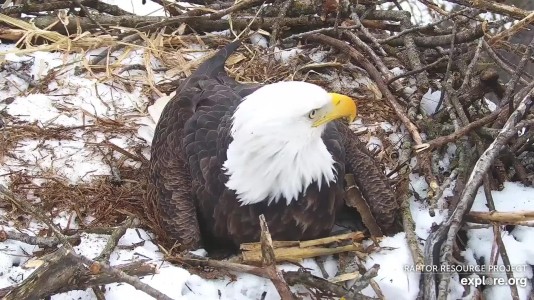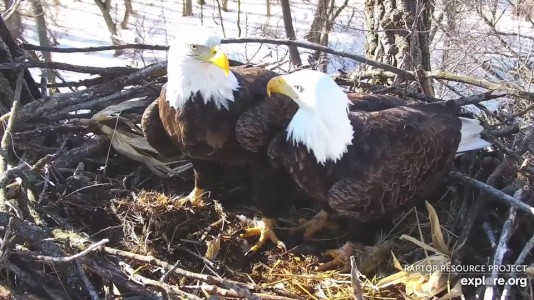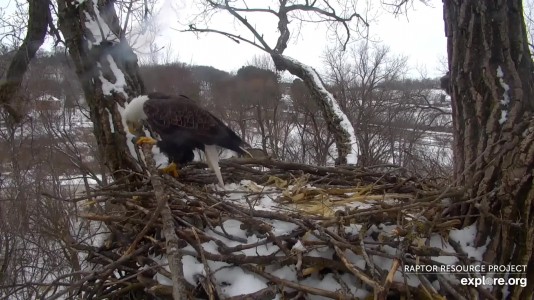Wrong Place, Wrong Time
Post by Ranger Zachary Behney of Katmai National Park
As the evening begins to darken and we realize the Falls Platform will be closing for the night, we begin to pack up our things. There are six large male bears (boars) fishing below the falls facing the thousands of gallons of water rushing down from Lake Brooks and destined for the Bristol Bay. Their efforts are aimed mostly at fishing while intermittently confronting or avoiding each other based on an ever changing system of dominance. This evening viewing session has rewarded us with opportunities to see sockeye salmon attempting to leap the bear buffet table known as the Brooks Falls. Some salmon were successful; others plucked out of the whitewater prior to their attempt. Directly or indirectly, all of these salmon will contribute their nutrient rich bodies to the web of life that thrives in the Brooks River area.
And then we hear it, a sound so subtle that it is almost inaudible over the raging falls, a sound that draws every bear’s attention away from fishing. It is the sound of a lightly barking spring cub (<1yr old) accompanying its two siblings and mother just below the viewing platform. With the arrival of this family group to the falls area, there is a major dynamic change, much like the addition of snow to a steep slope,if the right circumstances are present, disaster could result. Similar to avalanches, the act of adult bears killing cubs, or infanticide, is rarely seen, but still takes lives each year.
This particular sow, bear 402, has birthed three litters in the past and is known to fish the falls with spring cubs. Regardless of this past history the tensions are high. This year she looks thin, and like all sows with cubs, her stress levels are elevated. Anticipating what may occur, some observers decide to leave the platform. Nervously we watch her fish a section of the falls nearest to the platform while her cubs remain on the bank underneath us. Bear 856, possibly the most dominant boar on scene tonight has casually acknowledged her presence but is stable in his usual prime fishing spot, known as the “Jacuzzi.” At unique locations such as Brooks Falls, salmon abundance translates into dense concentrations of brown bears. Although these bears spend much of the year as solitary creatures, a social structure built around size and dominance emerges in these salmon rich river systems. Typically large boars stand atop this structure, but occasionally a sow with cubs is capable of influencing even the biggest bears to avoid her, and her young.
After successfully catching numerous fish, 402 has paused to check on her young cubs who are now huffing for her attention on the bank. Upon returning to the fish ladder for more salmon, she notices 856 is fishing closer than before and apparently within her bubble of personal space. Now back on land attending to her young, 402’s defenseless cubs huddle behind her feet while a face off ensues. Of all the other adult bears currently at the falls only 856 seems to have any interest in the cubs. An imaginary line is crossed and 402 explodes in a charge only to be effortlessly pinned in the river by 856. The three cocker spaniel sized cubs scatter. Mom is able to wrestle her way free, make landfall and flee the scene with two cubs trailing. Not far behind is 856, obviously intent on 402’s young. The sense of impending disaster grows when the third separated cub appears, now alone and unguarded under the platform. Minutes pass like hours while the remaining adult bears continue to fish the falls, paying no attention to the lone cub who is now wandering through the grasses upriver of the platform, searching frantically for his family.
With abundant protein rich salmon filling the river one must wonder what drives both male and female adult bears to aggressively pursue cubs. There are many hypotheses’ addressing this horrific act. Infanticide is an extreme display of dominance and, after all, it is that dominance which allows a bear almost unrestricted access to the most prime food resources, habitat and, mating priority. Considering the diversity of a brown bear’s diet, their role as an opportunistic omnivore is what drives them to explore their environment for any possible food resource. Some believe the reason is rooted deeper in their evolutionary biology. The act of removing a sow’s offspring can induce that female bear back into estrus, thus allowing the possibility of that male to pass on his genes with the now “available” sow. Regardless of the reason, infanticide is an outcome exhaustingly avoided by most mother bears.
After ten endlessly unsure minutes, the lone cub is still wandering in the grasses upriver of the platform. As 856 reappears, headed for those grasses, we are certain of the appalling outcome. This interaction takes place out of sight, but the sounds clue us in to the harsh reality of life as a bear.
On a daily basis we watch the triumphs of these animals as they catch gratuitous numbers of salmon, ensuring a security in fat for the long winter. Although we are fortunate enough to see their successes we must also accept these terrible acts as a testament to the hardships bears face throughout their lives. It also serves as a reminder that every adult bear we encounter at Brooks Camp owes thanks to a mother who was able to overcome the odds and protect herself and her young in a place where natural processes have no mercy, and the consequences mean life or death.


